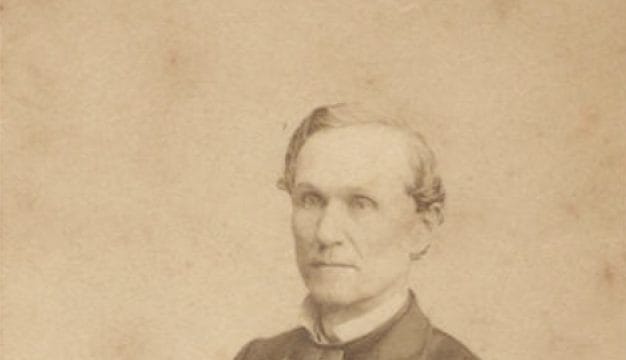Muscle Shoals Rhythm Section
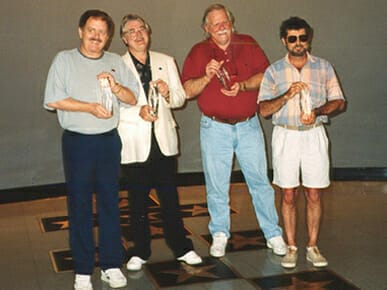 Muscle Shoals Rhythm Section
The Muscle Shoals Rhythm Section (MSRS) is one of America’s most notable American recording-studio “house bands.” The quartet emerged during the golden age of “rock & soul” in the 1960s and early 1970s and played on hit records by soul recording stars such as Percy Sledge, Wilson Pickett, and Aretha Franklin, as well as on country-rock songs by Glenn Frey, Levon Helm, Eddie Rabbitt, and Willie Nelson. The band also played on top-selling albums by Bob Seger, Paul Simon, and The Staple Singers. Southern rock band Lynryd Skynrd paid homage to the rhythm section in their 1974 hit, “Sweet Home Alabama.”
Muscle Shoals Rhythm Section
The Muscle Shoals Rhythm Section (MSRS) is one of America’s most notable American recording-studio “house bands.” The quartet emerged during the golden age of “rock & soul” in the 1960s and early 1970s and played on hit records by soul recording stars such as Percy Sledge, Wilson Pickett, and Aretha Franklin, as well as on country-rock songs by Glenn Frey, Levon Helm, Eddie Rabbitt, and Willie Nelson. The band also played on top-selling albums by Bob Seger, Paul Simon, and The Staple Singers. Southern rock band Lynryd Skynrd paid homage to the rhythm section in their 1974 hit, “Sweet Home Alabama.”
The quartet’s members—Roger Hawkins, Jimmy Johnson, Barry Beckett, and David Hood—commonly known as “The Swampers,” initially worked together for Florence Alabama Music Enterprises (FAME) Studios in Muscle Shoals during the early-to-mid-1960s. After leaving FAME in the spring of 1969, the quartet established itself as the Muscle Shoals (Sound) Rhythm Section and cultivated its definitive country-soul-tinged “Muscle Shoals” sound. The MSRS became a dominant presence on the American music scene for more than 25 years and continues to inspire international interest in American soul music.
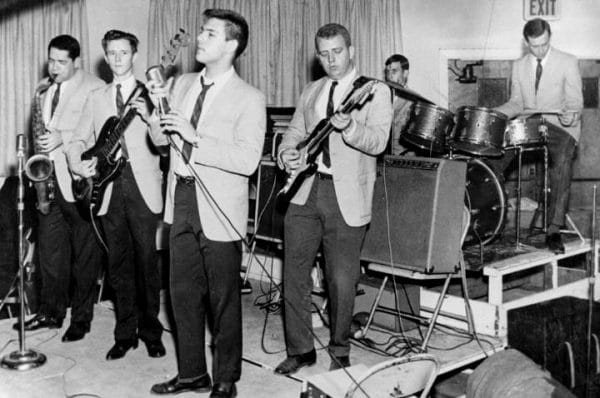 Jimmy Johnson and the Del-Rays
The members played separately for several Shoals-area rock ‘n’ roll bands in the mid-1960s prior to their work at FAME Studios. Guitarist Jimmy Johnson was a member of the Del-Rays and worked at FAME after 1962. Drummer Roger Hawkins was a member of Dan Penn‘s Mark V and began as a session musician at FAME and at Quinvy Studios in Sheffield in 1965. Keyboardist Barry Beckett, from Birmingham, began to work at FAME in 1966. Bass player David Hood played with the Shoals-based band The Mystics. He began recording at FAME as a trombonist in 1966 and worked as a studio bassist at Quinvy Studios before becoming the primary bassist at FAME in 1967.
Jimmy Johnson and the Del-Rays
The members played separately for several Shoals-area rock ‘n’ roll bands in the mid-1960s prior to their work at FAME Studios. Guitarist Jimmy Johnson was a member of the Del-Rays and worked at FAME after 1962. Drummer Roger Hawkins was a member of Dan Penn‘s Mark V and began as a session musician at FAME and at Quinvy Studios in Sheffield in 1965. Keyboardist Barry Beckett, from Birmingham, began to work at FAME in 1966. Bass player David Hood played with the Shoals-based band The Mystics. He began recording at FAME as a trombonist in 1966 and worked as a studio bassist at Quinvy Studios before becoming the primary bassist at FAME in 1967.
Singer-songwriter Arthur Alexander helped establish Muscle Shoals in the early 1960s as a regional recording center through his plaintive and visceral hits like “You Better Move On” and “Anna.” But the turning point for the future MSRS came when future members played backup to Percy Sledge on “When A Man Loves A Woman” in 1966, a song building upon Alexander’s style that defined the sound of an emerging regional genre called “country-soul.” The song, a textbook example of the genre, was anchored rhythmically by drummer Roger Hawkins and engineered by Jimmy Johnson at Norala Studios in Sheffield (the studio was later renamed Quinvy after its namesake, producer Quin Ivy). The recording topped both the pop and rhythm and blues (R&B) charts in April 1966. It also garnered the interest of Atlantic Records producer Jerry Wexler and established Muscle Shoals as a regional music center. As a result, Wexler began an association with the Muscle Shoals music scene that would last through the 1990s, ultimately providing financial support for the Muscle Shoals Sound Studios (MSSS) and promoting the MSRS.
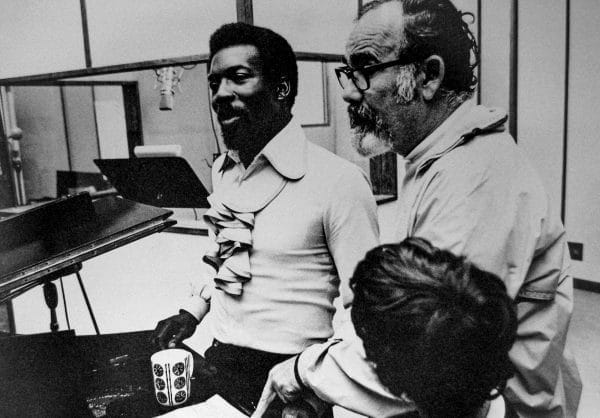 Wilson Pickett and Jerry Wexler
Realizing the musicians’ abilities in Muscle Shoals, Wexler brought soul singer and Alabama native Wilson Pickett to FAME in 1966 to record “Land of 1,000 Dances.” Wexler next produced Aretha Franklin’s bluesy “I Never Loved a Man (The Way I Love You)” and its soulful flipside “Do Right Woman—Do Right Man,” which were recorded at FAME in January 1967. It was Franklin’s first million-selling record and brought immediate music industry attention to the FAME rhythm section. In 1967, Hawkins, Johnson, Beckett, and Hood performed on Arthur Conley’s recording of Joe Turner’s R&B classic, “Shake, Rattle, & Roll,” which became an instant hit. The rhythm section was soon backing FAME’s soul artist roster, including Clarence Carter and Candi Staton. The uncanny cohesiveness of the four musicians earned them fame as a freelance rhythm section, and they began working on Atlantic recordings for singers Solomon Burke and Wilson Pickett and saxophone player Curtis “King Curtis” Ousley. From 1967 to 1969, Hawkins and Johnson played on Atlantic’s sessions for Aretha Franklin, including “Respect,” “Chain of Fools,” and “Since You Been Gone.” The four men played with Franklin on such hits as “Share Your Love With Me,” “The Weight,” “The Dark End of the Street,” and “Call Me.” These sessions, released on Franklin’s This Girl’s In Love With You, catapulted the soon-to-be MSRS onto the international scene.
Wilson Pickett and Jerry Wexler
Realizing the musicians’ abilities in Muscle Shoals, Wexler brought soul singer and Alabama native Wilson Pickett to FAME in 1966 to record “Land of 1,000 Dances.” Wexler next produced Aretha Franklin’s bluesy “I Never Loved a Man (The Way I Love You)” and its soulful flipside “Do Right Woman—Do Right Man,” which were recorded at FAME in January 1967. It was Franklin’s first million-selling record and brought immediate music industry attention to the FAME rhythm section. In 1967, Hawkins, Johnson, Beckett, and Hood performed on Arthur Conley’s recording of Joe Turner’s R&B classic, “Shake, Rattle, & Roll,” which became an instant hit. The rhythm section was soon backing FAME’s soul artist roster, including Clarence Carter and Candi Staton. The uncanny cohesiveness of the four musicians earned them fame as a freelance rhythm section, and they began working on Atlantic recordings for singers Solomon Burke and Wilson Pickett and saxophone player Curtis “King Curtis” Ousley. From 1967 to 1969, Hawkins and Johnson played on Atlantic’s sessions for Aretha Franklin, including “Respect,” “Chain of Fools,” and “Since You Been Gone.” The four men played with Franklin on such hits as “Share Your Love With Me,” “The Weight,” “The Dark End of the Street,” and “Call Me.” These sessions, released on Franklin’s This Girl’s In Love With You, catapulted the soon-to-be MSRS onto the international scene.
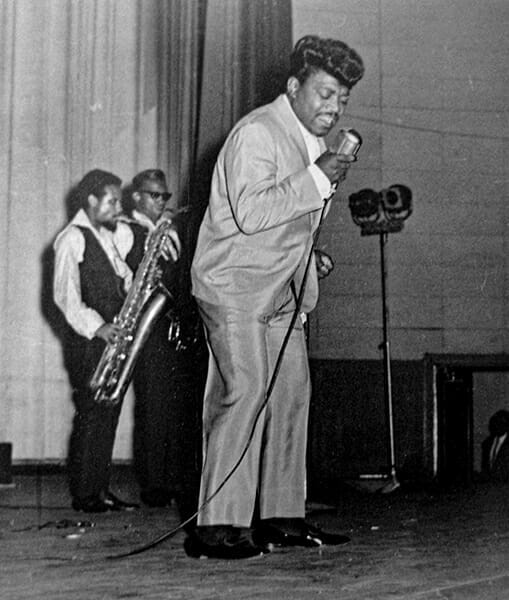 Percy Sledge
In April 1969 Beckett, Hawkins, Hood, and Johnson left the FAME studios and established their own studio, Muscle Shoals Sound Studios in Sheffield, dubbing themselves the Muscle Shoals Rhythm Section. They continued their relationship with Wexler and played on Cher’s 3614 Jackson Highway, which was the address of the new studio. In August 1969, the Rolling Stones recorded their smash hit “Brown Sugar” at MSS for their album Sticky Fingers. From the early-to-mid 1970s, the MSRS contributed to Atlantic Records’ catalogue, recording with Lulu, Herbie Mann, Wilson Pickett, Boz Scaggs, Rod Stewart, and most notably Willie Nelson on his acclaimed Phases and Stages (1974). During that period, the MSRS also backed up Joe Cocker, Millie Jackson, Laura Nyro, Linda Ronstadt, and Leon Russell. The MSRS also recorded with Percy Sledge, Bonnie Bramlett, and Eddie Hinton for the Capricorn label. Artists from the Memphis-based Stax Records frequently worked with the MSRS in the early-1970s as well, including Luther Ingram (“If Loving You Is Wrong, I Don’t Want to Be Right”), Johnnie Taylor (“Cheaper to Keep Her”), and The Staple Singers (“Respect Yourself” and “I’ll Take You There”).
Percy Sledge
In April 1969 Beckett, Hawkins, Hood, and Johnson left the FAME studios and established their own studio, Muscle Shoals Sound Studios in Sheffield, dubbing themselves the Muscle Shoals Rhythm Section. They continued their relationship with Wexler and played on Cher’s 3614 Jackson Highway, which was the address of the new studio. In August 1969, the Rolling Stones recorded their smash hit “Brown Sugar” at MSS for their album Sticky Fingers. From the early-to-mid 1970s, the MSRS contributed to Atlantic Records’ catalogue, recording with Lulu, Herbie Mann, Wilson Pickett, Boz Scaggs, Rod Stewart, and most notably Willie Nelson on his acclaimed Phases and Stages (1974). During that period, the MSRS also backed up Joe Cocker, Millie Jackson, Laura Nyro, Linda Ronstadt, and Leon Russell. The MSRS also recorded with Percy Sledge, Bonnie Bramlett, and Eddie Hinton for the Capricorn label. Artists from the Memphis-based Stax Records frequently worked with the MSRS in the early-1970s as well, including Luther Ingram (“If Loving You Is Wrong, I Don’t Want to Be Right”), Johnnie Taylor (“Cheaper to Keep Her”), and The Staple Singers (“Respect Yourself” and “I’ll Take You There”).
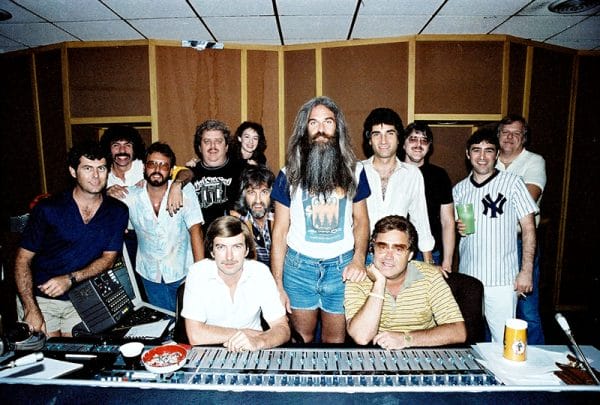 The Oak Ridge Boys
In 1973, the MSRS toured Europe with Steve Winwood and Traffic, recorded On the Road and played on Traffic’s studio album, Shootout at the Fantasy Factory. The quartet was also versed in Jamaican reggae, as revealed on Jimmy Cliff’s “Sitting in Limbo.” Paul Simon recorded There Goes Rhymin’ Simon in 1973 with the MSRS, featuring the songs “Kodachrome” and “Loves Me Like A Rock.” The MSRS then played on the Grammy Award-winning title track for Simon’s Still Crazy After All These Years (1975). In 1976, former Stax producer Don Davis and the MSRS recorded Johnnie Taylor’s Eargasm and with Bobby Womack, the MSRS co-produced Home Is Where The Heart Is. The MSRS collaborated often with Bob Seger, playing on his hits “Mainstreet” (1976), “We’ve Got Tonight (1978),” and the ubiquitous “Old Time Rock and Roll” (1978). The MSRS also backed Texas blues-rocker Delbert McClinton under the umbrella of the Muscle Shoals Sound label, on The Jealous Kind (1980). From the late-1970s through the mid-1980s, the MSRS supported Lou Ann Barton, Glenn Frey, Levon Helm, Dr. Hook, Julian Lennon, Frankie Miller, The Oak Ridge Boys, and Eddie Rabbitt. The MSRS began an important association with Malaco Records in the late-1970s, which resulted in a host of regional soul hits by Dorothy Moore, Z. Z. Hill, and Little Milton. In 1985 keyboard player Beckett relocated to Nashville after the sale of MSS to Malaco Records that year; he passed away in Hendersonville, Tennesee, on June 16, 2009.
The Oak Ridge Boys
In 1973, the MSRS toured Europe with Steve Winwood and Traffic, recorded On the Road and played on Traffic’s studio album, Shootout at the Fantasy Factory. The quartet was also versed in Jamaican reggae, as revealed on Jimmy Cliff’s “Sitting in Limbo.” Paul Simon recorded There Goes Rhymin’ Simon in 1973 with the MSRS, featuring the songs “Kodachrome” and “Loves Me Like A Rock.” The MSRS then played on the Grammy Award-winning title track for Simon’s Still Crazy After All These Years (1975). In 1976, former Stax producer Don Davis and the MSRS recorded Johnnie Taylor’s Eargasm and with Bobby Womack, the MSRS co-produced Home Is Where The Heart Is. The MSRS collaborated often with Bob Seger, playing on his hits “Mainstreet” (1976), “We’ve Got Tonight (1978),” and the ubiquitous “Old Time Rock and Roll” (1978). The MSRS also backed Texas blues-rocker Delbert McClinton under the umbrella of the Muscle Shoals Sound label, on The Jealous Kind (1980). From the late-1970s through the mid-1980s, the MSRS supported Lou Ann Barton, Glenn Frey, Levon Helm, Dr. Hook, Julian Lennon, Frankie Miller, The Oak Ridge Boys, and Eddie Rabbitt. The MSRS began an important association with Malaco Records in the late-1970s, which resulted in a host of regional soul hits by Dorothy Moore, Z. Z. Hill, and Little Milton. In 1985 keyboard player Beckett relocated to Nashville after the sale of MSS to Malaco Records that year; he passed away in Hendersonville, Tennesee, on June 16, 2009.
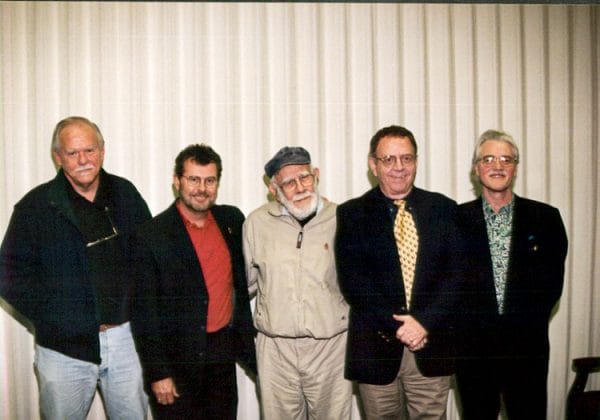 MSRS and Jerry Wexler
The remaining members of the MSRS continued working as a studio band during the 1990s, often with Clayton Ivey on keyboards. Highlights of that decade include Etta James’ The Right Time (1992), Dan Penn’s Do Right Man (1994), and Joe Louis Walker’s Preacher and the President (1998). In 1995, the MSRS was inducted into the Alabama Music Hall of Fame. The millennium was marked with sessions at MSS featuring Malaco stalwarts Johnnie Taylor, whose There’s No Good In Goodbye, recorded in the summer of 1999, was to be his last studio effort, and septuagenarian Bobby “Blue” Bland, who returned to MSS to cut Blues at Midnight in the winter of 2001. Hawkins is now retired, Johnson works regularly as a producer, and Hood is still active as a session bassist. His son, Patterson Hood, is a founding member of the acclaimed band the Drive-By Truckers. In 2005, Malaco sold Muscle Shoals Sound to Cypress Moon Films. In October 2008, the MSRS was inducted into the Musicians Hall of Fame in Nashville. In 2013, the Muscle Shoals Sound and its musicians were featured in the documentary Muscle Shoals, by the Ear Goggles production company.
MSRS and Jerry Wexler
The remaining members of the MSRS continued working as a studio band during the 1990s, often with Clayton Ivey on keyboards. Highlights of that decade include Etta James’ The Right Time (1992), Dan Penn’s Do Right Man (1994), and Joe Louis Walker’s Preacher and the President (1998). In 1995, the MSRS was inducted into the Alabama Music Hall of Fame. The millennium was marked with sessions at MSS featuring Malaco stalwarts Johnnie Taylor, whose There’s No Good In Goodbye, recorded in the summer of 1999, was to be his last studio effort, and septuagenarian Bobby “Blue” Bland, who returned to MSS to cut Blues at Midnight in the winter of 2001. Hawkins is now retired, Johnson works regularly as a producer, and Hood is still active as a session bassist. His son, Patterson Hood, is a founding member of the acclaimed band the Drive-By Truckers. In 2005, Malaco sold Muscle Shoals Sound to Cypress Moon Films. In October 2008, the MSRS was inducted into the Musicians Hall of Fame in Nashville. In 2013, the Muscle Shoals Sound and its musicians were featured in the documentary Muscle Shoals, by the Ear Goggles production company.
Further Reading
- Bowman, Rob. Soulsville, U.S.A.: The Story of Stax Records. New York: Schirmer Books, 1997.
- Fuqua, C. S. Music Fell on Alabama: The Muscle Shoals Sound That Shook the World. Montgomery, Ala.: NewSouth Books, 2006.
- Guralnick, Peter. Sweet Soul Music: Rhythm and Blues and the Dream of Southern Freedom. New York: Harper & Row, 1986.
- Hoskyns, Barney. Say It One Time for the Broken Hearted. London: Fontana Books, 1987.
- Moorman, Mark, director. Tom Dowd & the Language of Music. Film. New York: Palm Pictures, 2003.
